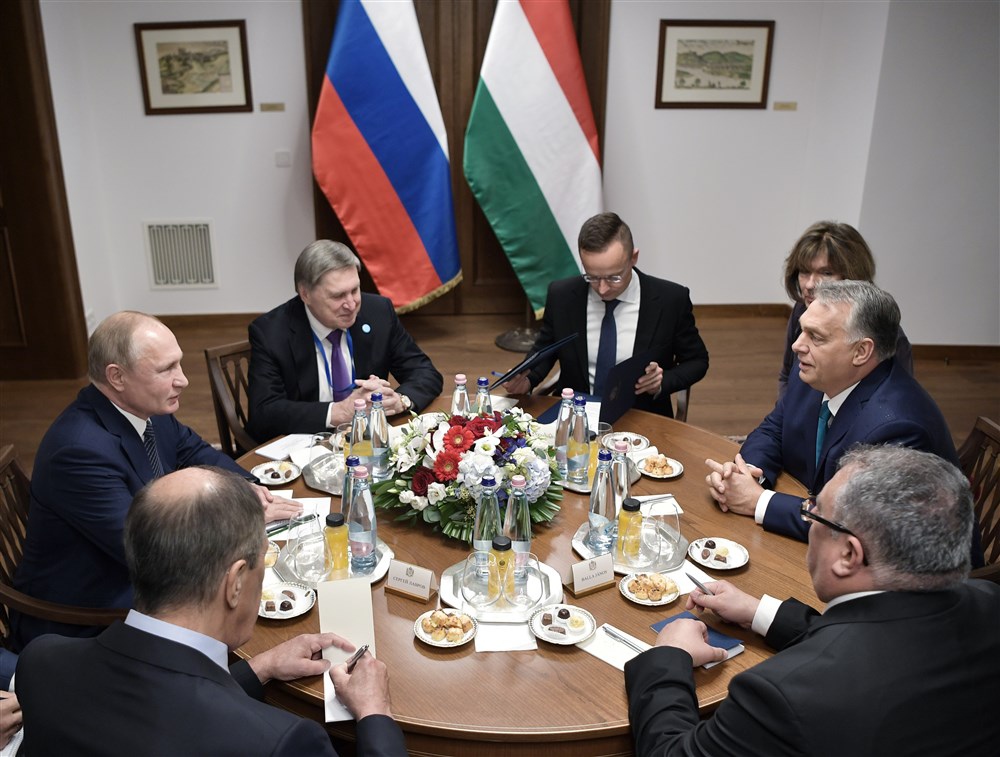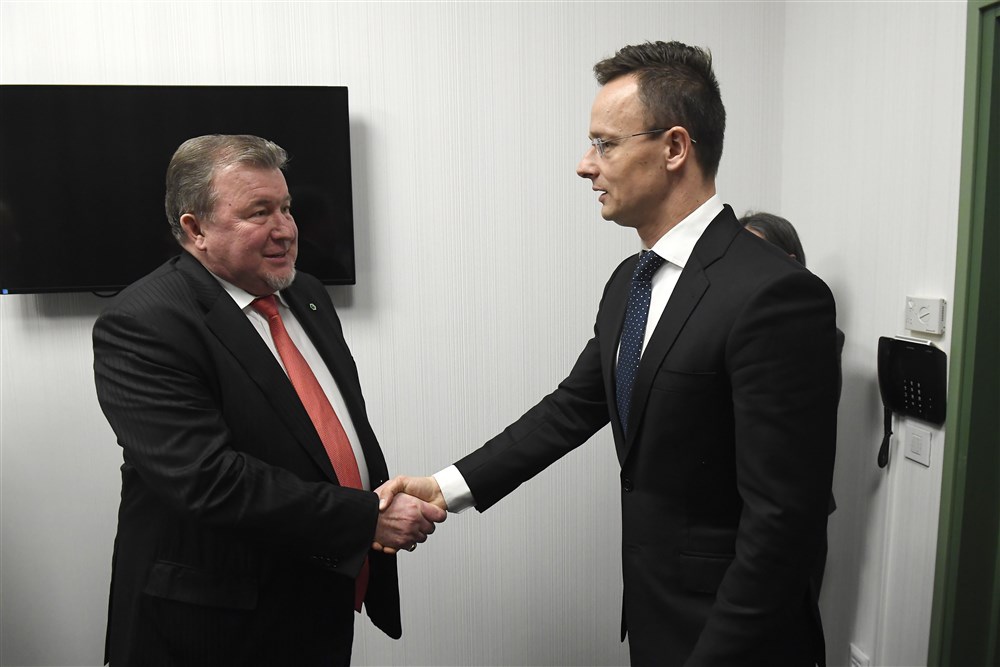
The decision of the four countries to leave the International Investment Bank (IIB), also known as the “Russian Spy Bank”, came within days of Russia invading Ukraine. The legal proceedings were cumbersome in certain countries, due to the financial risks such a move entailed. Set up in 1970, the Bank continues to operate today in Budapest, although key decisions are taken in Moscow.
At the end of February, a few days after the invasion, Bucharest, Prague, Bratislava and Sofia* announced they started legal proceedings in order to withdraw from the International Investment Bank and the International Bank for Economic Cooperation (IBEC).
IIB – Moscow’s “Trojan horse” in Europe?
IIB was set up in 1970 at Moscow’s initiative and was meant to rival with the West’s financial institutions. After the dissolution of the USSR, the Bank entered a state of self-preservation until 2012, when it was relaunched as a major player in global banking, its members including Russia, Hungary, Bulgaria, the Czech Republic, Slovakia, Romania, Cuba, Mongolia and Vietnam.
Prior to 2014, when Russia captured Crimea and launched false-flag operations in Donbas, the IIB had not been represented on capital markets. Moscow wanted to rebrand the bank as a European financial institution that should facilitate its access to strategic markets.
On July 1, 2015, during the Ponta administration, Finance Minister Eugen Teodorovici signed in Moscow new terms for Romania’s participation in IIB, whereby Romania pledged to continuously raise its contribution. At the end of 2018, Romania increased its capital participation by an additional 4 million EUR, putting Romania’s contribution at 7.04%.
Bonds issued by the IIB over the following years would be listed on stock markets in Bucharest, Budapest, Vienna, Moscow and Prague, their total value exceeding 2.5 billion EUR. The IIB would implement projects in Romania (both directly, as well as indirectly via the Republic of Moldova), Bulgaria, the Czech Republic and Hungary. Experts argued that, by providing swifter and easier, although not so cheap, access to capital, Russia expanded its influence to areas it deemed of strategic importance.
In 2019, the scandal that put the IIB in the limelight was the row between Liberal Senator Florin Cîțu and Finance Minister Eugen Teodorovici, when Cîțu called Teodorovici a “Russian spy”.
“The Russian Spy Bank”
In 2019, the IIB made a bold move, relocating its headquarters to Budapest, at the request of Viktor Orbán.
Hungary’s portfolio with the IIB increased by 217%, from 57 million EUR to 180 million EUR. Imre Laslóczki, a 1987 graduate of MGIMO – the Moscow State Institute of International Relations, also Hungary’s former ambassador to Kazakhstan, Kyrgyzstan, Tajikistan and Azerbaijan, was appointed vice-chairman of the bank.
In 2021, the IIB moved to Lánchíd Palota (the Chain Bridge Palace) on the Danube River, a national heritage site. At first, the bank had considered a building across the street from the American embassy, but Washington opposed the move. The first major decision taken by the IIB’s Board of Governors in December would be to accept Serbia’s bid to join the IIB. Serbia would thus become the first member to join the bank after 50 years of operations. 6 of the 10 members were now European countries, with a joint portfolio of 55% of the bank’s operations, and the IIB was growing to become a major European player. Since the bank resumed operations in 2012, the volume of loans had gone up 13 times, reaching 1.3 billion EUR.

IIB Headquarters, Budapest. @IIB
Romanian businesses had taken out loans worth 265 million EUR. Romania’s case was special. After the annexation of Crimea, the IIB had issued bonds only in three IIB members – Russia, Slovakia and Romania – with a total value of over 200 million EUR. Starting 2008, the IIB had invested in EUR-denominated government bonds worth 123 million EUR in Romania.
The relocation of the IIB in Budapest in 2019 put on high alert the Hungarian opposition, and later the Americans. The bank was suspected of being a branch of Russian secret services. The Hungarian Government responded to rumors by arguing that the IIB had invested 150 million HUF (the equivalent of 418 million EUR) in Hungarian companies and was an international, not a Russian bank, and a successful one too.
After the annexation of Crimea, Viktor Orbán strengthened economic and political ties with Moscow, despite economic sanctions targeting the latter. He signed an 11-million-EUR agreement with Rosatom for expanding the Paks nuclear power plant. Orbán was in desperate need of capital, and went looking for it in Moscow, Istanbul and Beijing. Moreover, he wanted to turn Budapest into a regional financial hub.
The new agreements, including the relocation of IIB in Budapest, would become entrenched after Vladimir Putin’s visit to Budapest, his third after the ones in 2015 and 2017.

President Putin meeting Viktor Orban during a visit to Budapest, October 2019. EPA-EFE/ALEXEY NIKOLSKY / SPUTNIK / KREMLIN
Orbán provided diplomatic privileges, including immunity, to IIB employees and their families. Furthermore, IIB guests could enter Hungary “regardless of their citizenship”. Representatives of Hungarian authorities were not allowed to enter the building without prior authorization, and bank assets were “immune to all restrictions, regulations, control and moratoriums”.
The Americans believed IIB was actually a Russian spy nest at the heart of the EU. US congressmen called on Secretary of State Mike Pompeo to get involved and talk Orbán into reconsidering, the New York Times wrote. Pompeo was unsuccessful.
Financial Times revealed that the Moscow-appointed chairman of the IIB, Nikolai Kosov, was the descendant of a family of Soviet spies. His father had been the head of the KGB’s Budapest branch in the 1970s, whereas his mother was “one of the most remarkable Soviet spies of the 20th century”, according to the Russian government news agency TASS. In turn, Hungary’s representative in the IIB, Imre Boros, had secretly been an agent of communist intelligence.

Hungary's foreign affairs minister Peter Szijjarto and Nikolai Kosov, IIB Chairman, March 20, 2018, EPA-EFE/Tamas Kovacs
The opposition is accusing Orbán of using the IIB to finance oligarchs from his inner circle. In fact, apart from the IIB, Orbán also developed ties with Hungarian commercial banks, which meant politicians close to Budapest were welcomed by the aforementioned banks. In March 2022, to finance her election campaign, Marine le Pen took a 10.6 million EUR loan from Hungary’s biggest bank, MKB, where Lőrinc Mészáros, one of Orbán’s close associates, owns a 40% stake.
Being unable to take out loans in France, where the National Front had incurred historic debt, Marine le Pen had borrowed another 9 million EUR in 2014 from First Czech-Russian bank, also to fund her election campaign, after expressing support for Russia’s annexation of Crimea.
Bulgaria: the first EU member state to leave the IIB
Bulgaria was one of the largest shareholders at IIB. Still, in the context of the EU’s concerted response to the Russian invasion of Ukraine, the country concluded its dealings with the bank on March 2, 2022, and is expected to recover its 10% stake, tantamount to some 123 million EUR.
The decision was green-lit by the ruling coalition at the time, led by the pro-Western and pro-European party “We continue the change”, which was ousted in June. At the same time, in early March, Bulgaria also severed ties with IBEC.
Starting 2014, one of IIB’s biggest clients was the Eurohold Bulgaria holding, which in 2021 took over the local assets of the disbanded Czech energy giant CEZ. IIB awarded Eurohold a seven-year loan worth 7 million EUR and invested 54 million EUR in the group’s international expansion. Eurohold did not comment on its dealings with IIB after Bulgaria withdrew from the bank.
Huvepharma, a pharmaceutical corporation linked with the head of Nova Broadcasting Group and PFC Ludodogoret, Kiril Domuschiev, is another client of IIB.
Romania: keeping an eye on financial risks
Decreed by the government in May, Romania’s withdrawal from two banks controlled by Russia was finalized with the ratifications of the two laws by president Klaus Iohannis on November 21. The decision thus condemned the agreement on the creation of IIB in 1970 and the Convention on multilateral settlements in transferable rubles and the organization of the International Bank for Economic Cooperation (IBEC), signed in 1963. Romania’s withdrawal as a shareholder is expected to be finalized within six months of submitting the notification.
Although the Czech Republic, Slovakia and Bulgaria were also supposed to withdraw, Romania is the only country that notified the two banks, as it faced the most financial risks. Six privately administered pension funds had made investments in IIB bonds worth 784 million RON. There’s a risk these entities will now demand compensations from the state, which is amplified by the downgrading of these banks by the top international financial agencies.
On November 1, however, the IIB redeemed 500 million RON in bonds from a series of Romanian investors, a debt instrument that marked the largest issue of bonds in RON denomination.
The Government should also consider Romania’s stake in the two banks: Romania is listed at IIB with a subscribed capital of 26.10 million EUR, and with 14.23 million EUR at IBEC, which translates into a total financial burden on the state budget of over 40 million EUR.
The Czech Republic: finally leaving the IIB
The Czech Republic will leave the IIB on January 27, 2023. Right now, the only question is whether the Czech Republic will get back the 30.37 million EUR it invested in the bank, accounting for its 8.89% stake. For that to happen, the Czech Republic needs support from other members, as Seznam Zprávy has argued. The Czech Minister of Finance relies on cooperation with Hungary and other partners in Asia, such as Vietnam and Mongolia.
The Czech Republic has been planning for years to withdraw from the IIB. NATO allies, especially the United States, have long called on the Czech Republic to do so, arguing that Russia is using the bank also to bypass sanctions, launder money and conduct espionage activities.
The Respekt daily wrote in 2019 that the USA raised the issue during various meetings with their Czech partners. A year later, American diplomacy described the IIB as a “platform for expanding Russia’s malign influence”. “We urge NATO member states with a stake in the IIB and IBEC to seriously consider the threat posed by these strategic competitors who disregard our Western values, particularly our commitment towards democracy and the rule of law”, Deník N quoted an American diplomat.
At the time, the ruling coalition made up of the ANO populist movement and the Social-Democratic Party, backed by the communists, defended however the Czech Republic’s IIB membership. “Although the IIB is an institution founded at the time of the Comecon, it successfully underwent a transformation and built a stable position, supporting Czech business”, the Czech Finance Minister said at the time. “The sectors targeted by the bank’s activities are appealing to Czech businesses, and most of them also fall in line with the 2012-2020 Export Strategy of the Czech Republic”, the Czech official added.
Still, Andrej Babiš’s Cabinet eventually decided last year to examine the benefits of the Czech Republic’s IIB membership.
From here on out, relations with Russia swirled out of control. In spring, 2021, Russia was exposed for playing a part in the 2014 Vrbětice ammunition warehouses explosions, which led to the Czech Republic freezing relations with the Russian Federation. Diplomatic ties were further worsened after Russia attacked Ukraine in February this year.
Meanwhile, a new pro-European government took power in the Czech Republic, with plans to withdraw from the IIB slated for early March this year. “The withdrawal of the Czech Republic from the two post-communist banks in the shortest time possible is an absolute must in the current global security context”, Prime Minister Petr Fiala said. “The Czech Republic’s membership in the two institutions brings no economic benefits. Both banks are relics of a bygone age. The economic impact of the Czech Republic’s withdrawal will be minimum”, Finance Minister Zbyněk Stanjura said. The decision was also signed by the former pro-Russian president Milos Zeman.
Slovakia too notified the IIB of its plans to withdraw on July 29, two days after Prague submitted its own request. The decision will take effect on January 29, 2023.
Although the IIB’s rating is currently “junk”, Moscow and Budapest continue to do business
Following the political decision of the four states to leave the IIB, the bank’s rating was downgraded by financial rating agencies: Fitch downgraded IIB’s rating from A to BBB with a “major risk” prospect, Standard and Poor’s changed its rating from stable to negative, while Moody’s rated IIB as junk, namely unsuitable for risk-averse investors.
Hungary remains the only member of the EU to still own a stake in the IIB. In October 2022, the IIB awarded a 50-million-USD loan to Hungary for developing economic ties with Uzbekistan. In May, the National Bank of Hungary finished repatriating its 3-ton gold reserve from London with a total worth of 130 million USD.
Ever since March 2022, when all the other EU Member States had announced their plans to withdraw from the IIB, the Hungarian opposition called on Viktor Orbán to take a similar decision, expel IIB employees and freeze the development of the Paks NPP.

People protesting against Russia's invasion of Ukraine at the IIB Headquarters, March 1, 2022, EPA-EFE/Szilard Koszticsak
Orbán’s pro-Russian response sparked protests in Budapest, right in front of the “spy nest” building.
For his part, Orbán continues to look to the East.
*This article was written with support from Veridica’s contributors, Svetoslav Todorov from Bulgaria and Michael Švec from the Czech Republic.


